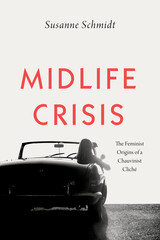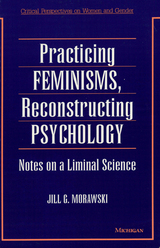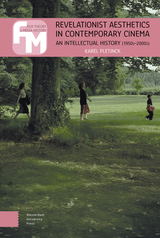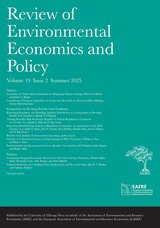2 books about Feminist psychology

Midlife Crisis
The Feminist Origins of a Chauvinist Cliché
Susanne Schmidt
University of Chicago Press, 2020
The phrase “midlife crisis” today conjures up images of male indulgence and irresponsibility—an affluent, middle-aged man speeding off in a red sports car with a woman half his age—but before it become a gendered cliché, it gained traction as a feminist concept. Journalist Gail Sheehy used the term to describe a midlife period when both men and women might reassess their choices and seek a change in life. Sheehy’s definition challenged the double standard of middle age—where aging is advantageous to men and detrimental to women—by viewing midlife as an opportunity rather than a crisis. Widely popular in the United States and internationally, the term was quickly appropriated by psychological and psychiatric experts and redefined as a male-centered, masculinist concept.
The first book-length history of this controversial concept, Susanne Schmidt’s Midlife Crisis recounts the surprising origin story of the midlife debate and traces its movement from popular culture into academia. Schmidt’s engaging narrative telling of the feminist construction—and ensuing antifeminist backlash—of the midlife crisis illuminates a lost legacy of feminist thought, shedding important new light on the history of gender and American social science in the 1970s and beyond.
The first book-length history of this controversial concept, Susanne Schmidt’s Midlife Crisis recounts the surprising origin story of the midlife debate and traces its movement from popular culture into academia. Schmidt’s engaging narrative telling of the feminist construction—and ensuing antifeminist backlash—of the midlife crisis illuminates a lost legacy of feminist thought, shedding important new light on the history of gender and American social science in the 1970s and beyond.
[more]

Practicing Feminisms, Reconstructing Psychology
Notes on a Liminal Science
Jill Morawski
University of Michigan Press, 1994
Practicing Feminisms, Reconstructing Psychology is a valuable survey of developments to date in feminist psychology and a provocative assessment of its future possibilities. For many psychologists engaged with the questions raised by modern feminist, the reconciliation of scientific methods and feminist commitments has been a complicated and sometimes perplexing project. In her book, Jill Morawski attempts to move beyond the apparent impasses toward a constructive feminist psychology. The book assesses the substantive advances feminist psychology has made and proposes ways in which those transformations can lead to new research and methodologies. These transformative interventions, Morawski argues, have often consisted of local and partial alterations to established methods rather than a programmatic "metatheory" or a formulaic methodology. She reviews a variety of exemplary studies that demonstrate how such intermittent practices, taken together, constitute a groundword for radically new forms of psychological inquiry. The study describes feminist challenges to long-held conceptions of objectivity, subjectivity, and validity and examines emergent problems and ongoing debates. The feminist innovations discussed reveal the impossibility of a pure and abstract objective stance and demonstrate the feasibility of situated and critical objective practices. Morawski also shows how experimental investigative strategies are generating new perspectives on subjectivity, which incorporate agency as well as dependence, reflection as well as reactivity. Feminist inquiry is modifying the procedures through which knowledge is warranted, with different evaluations of validation processes. Despite the transformations in these areas, the pursuit of a feminist psychology remains in transition, in a "liminal" space. Among the emerging issues Morawski explores are vicissitudes of reflexivity, the investigator's self, and the cultural bases of psychological knowledge.
[more]
READERS
Browse our collection.
PUBLISHERS
See BiblioVault's publisher services.
STUDENT SERVICES
Files for college accessibility offices.
UChicago Accessibility Resources
home | accessibility | search | about | contact us
BiblioVault ® 2001 - 2025
The University of Chicago Press









